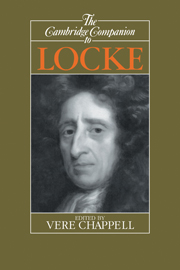Book contents
- Frontmatter
- Introduction
- 1 Locke's life and times
- 2 Locke's theory of ideas
- 3 Locke's philosophy of body
- 4 Locke's philosophy of mind
- 5 Locke's philosophy of language
- 6 Locke's theory of knowledge
- 7 Locke's philosophy of religion
- 8 Locke's moral philosophy
- 9 Locke's political philosophy
- 10 Locke's influence
- Bibliography
- Index
4 - Locke's philosophy of mind
Published online by Cambridge University Press: 28 May 2006
- Frontmatter
- Introduction
- 1 Locke's life and times
- 2 Locke's theory of ideas
- 3 Locke's philosophy of body
- 4 Locke's philosophy of mind
- 5 Locke's philosophy of language
- 6 Locke's theory of knowledge
- 7 Locke's philosophy of religion
- 8 Locke's moral philosophy
- 9 Locke's political philosophy
- 10 Locke's influence
- Bibliography
- Index
Summary
The topics to be covered in this chapter are as follows: (I) Locke's acceptance of Descartes's view that there is a radical separation, a perhaps unbridgeable gap, between the world's mental and its physical aspects; Locke's view of (II) the cognitive aspects and (III) the conative aspects of the mind; (IV) what Locke said about the possibility that “ matter thinks” that is, that the things that take up space are also the ones that have mental states; (V) the question whether all thought could be entirely caused by changes in the physical world; (VI and VII) what it is for a single mind to last through time; and (VIII) what it is for a mind to exist at a time when it is not doing anything.
PROPERTY DUALISM
Descartes held a position that is sometimes called “property dualism.” According to it, the properties that things can have fall into two classes - those pertaining to materiality and those pertaining to mentality - with no overlap between them. This is best understood as involving also a dualism of concepts: the concepts that can be applied to things fall into two classes, with no concept in either class being reducible to or explainable through any belonging to the other class.
- Type
- Chapter
- Information
- The Cambridge Companion to Locke , pp. 89 - 114Publisher: Cambridge University PressPrint publication year: 1994
- 9
- Cited by

